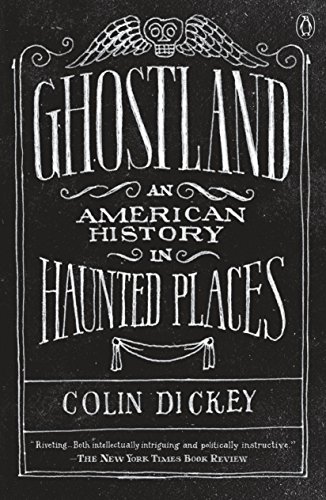
![]()
![]()
![]()
![]()
![]()
Why didn’t I pick up this book sooner? I’ve been writing papers about how (albeit fictional) ghost stories are inextricably connected to societal fears and anxieties for what seems like forever now … okay, to be honest, probably only a year. But still!
This read made my devilish little pseudo-skeptic’s heart happy. Dickey addresses how America deals with its numerous tragedies and white guilt by concocting stories of literal hauntings; he deals especially with the treatment of marginalized people in the U.S. As someone who is, put politely, obsessed with this topic, I didn’t think I would really learn anything from this book. I was so wrong! Among my favorite subjects were the gender politics behind the demonizing of Sarah Winchester and the disapproval of the female-dominated Spiritualist movement. If you’re into thanatology as well, Dickey also briefly acknowledges the history of our funerary traditions and our anxieties surrounding the dead body. Fitting, since I recently found out that he’s a member of The Order of the Good Death, a society founded by practicing mortician and death positivity advocate Caitlin Doughty. Its members are scholars, artists, writers, and morticians who work to revolutionize the death industry. Swoon.
His vast exploration of America’s ghost tales is well-organized and interestingly broadens from the domestic sphere to civic hauntings and even cursed cities. This impressed me, since explaining the ghost lore of an entire country is a particularly daunting project, and also helped me compartmentalize the reasons for the generation of stories in different locations. Dickey is clearly a fan of Shirley Jackson and makes multiple sly references to The Haunting of Hill House throughout his book, which I enjoyed as a friendly nod to other haunted-house enthusiasts. At times, certain references took the heaviness out of a text that addresses the horrors of American history.
There was an understandable bitterness in Ghostland, not only toward our exploitation of indigenous people and people of color, but toward the fact that this exploitation can sometimes continue through the way we structure our ghost stories, either omitting the reality of the tragedy because we see it as verboten, or making a buck off of embellishing the gory details of someone else’s suffering. However, at times, the tone came off as looking down on all ghost hunters and legend trippers. We’re not all vandals, and we don’t all believe that everything we see or hear is a ghost! In fact, some of us, like me (and I think like Dickey himself) tend toward disbelief, finding only one or two absolutely inexplicable cases in our lifetimes. I think this was truly what the author was going for, but that point got lost behind the horror of many thrill-seekers’ behavior. If the book was lacking in any area, I wished Dickey would have explored the possibility of people using some types of ghost stories as a positive cultural influence. I think this exists, and I believe legend tripping can have its benefits if done respectfully: it’s how some of us learn to cope with death and mystery, for one thing. And it’s how some of us (again, maybe like Dickey, but I’m mostly talking about myself) cut through the facade of the “this-great-country” speech and get down to the truth of history and the naked acknowledgement of our inner struggles. When it comes to discerning cultural truths, I find ghost lore as transparent as an apparition.
Although this is a history-driven book, it is peppered with some harrowing tales of spirits. It doesn’t matter that Dickey pretty much systematically lays out the legends and subsequently disproves them as mere tall tales– because, as he says, “the ghost is too important” to us. This is a must-read for any fan of horror or the supernatural. Despite their impossibility, these stories still chill.